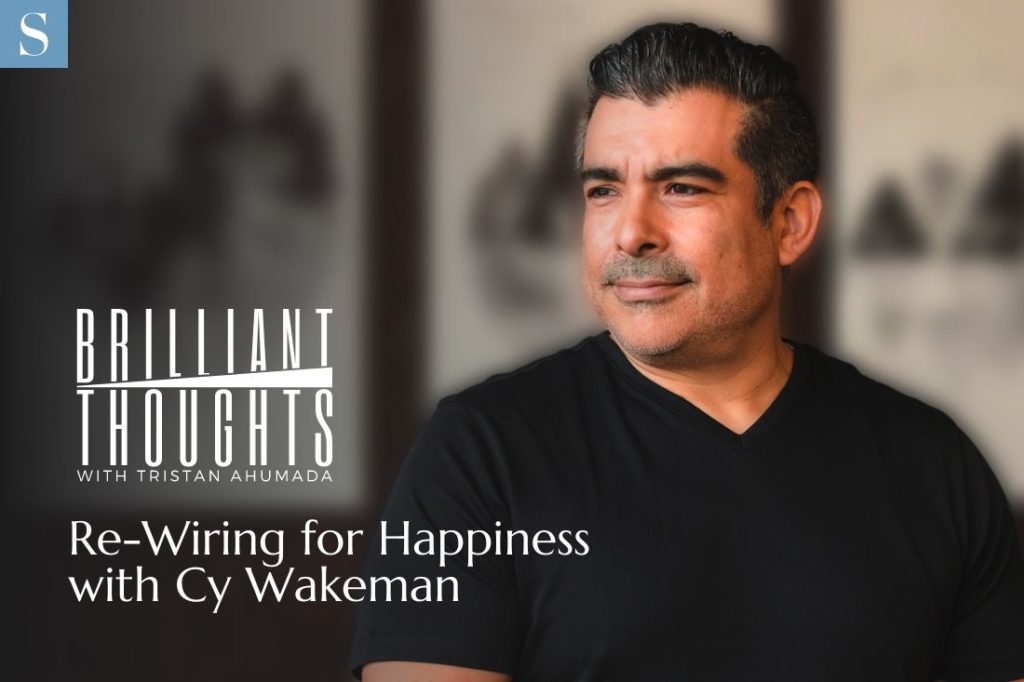As a staple party favor, bag stuffer and prize, the Chinese finger trap is a toy that almost every child encounters at some point. If you had one of these woven bamboo novelties, you know that they’re not very exciting, but they do teach a valuable lesson: You have to stop struggling to get free.
Unfortunately, this isn’t wisdom that most people embrace. In fact, adulthood seems to be all about doing the opposite—trying to control, manipulate and alter circumstances in an attempt to find happiness. Cy Wakeman, best-selling author, drama researcher and leadership consultant, is here to remind us that a little acceptance goes a long way.
To Wakeman, the inability to relinquish control is a major driver of discontent. Her newest book, Life’s Messy, Live Happy, is a timely and critical message about the dangers of control, ego and duality. In a special interview with Brilliant Thoughts’ Tristan Ahumada, Wakeman explains that it’s only through accepting uncertainty that we find contentment in an imperfect world.
Challenge your ego’s reality.
For many people, stress is a knee-jerk response to unpredictability, chaos or tension. In order to disrupt stress, you need to identify the thought or narrative that’s fueling it. Instead of automatically accepting a worried thought, Wakeman says you should meet it with inquiry: Is that thought actually true? She calls this process “breaking up with your ego.”
“If I’m having thoughts that are stressful, I’ll write [the] thought down because writing it gets it out of the hands of your ego,” Wakeman tells Ahumada. “Then I apply questions to that thought: What do I know for sure? What could I do next to help?”
When you allow anxious thoughts to run unchecked in your mind, your ego is controlling your reality. By putting them in writing, you begin to realize that you are not your thoughts—a distinction that allows you to regulate your state of being. Wakeman believes that this intentionality can be applied to conversations with others as well.
“I think the power we have right now is not leading people—it’s managing the energy of people,” she explains. Although you can’t control others, you can control your reactions to negativity. To change the tone of the discussion, try shifting the conversation to a more uplifting topic.
Be willing to live in the mystery.
Are you moving through the world in survival mode, anxious to make heads or tails of every situation? Hypervigilance causes us to make snap decisions, viewing everything and everyone through a lens of duality. To Wakeman, the tendency to label things in binary terms is a mistake.
“Be very slow to name anything externally, whether it’s good or bad; be curious a little longer,” she says. “Be in the mystery, not the mastery.”
When you automatically label something as good or bad, you trigger instinctual responses: fight or flight, grab, defend, etc. These gut reactions are problematic because they create a false opposition. Wakeman believes that to be happy in the imperfect world, we need to transcend duality and realize that many things can be true at the same time.
Count everything as a blessing.
“I never intended to become an author,” Wakeman tells Ahumada. To her, reading and writing were therapeutic activities, and the fact that she’s experienced so much success in both seems to be almost secondary. She’s had a lot of visible and invisible help along the way, privileges that not everyone gets. The subsequent humility is grounded firmly in her gratitude practice.
At some point during every day, Wakeman makes a gratitude list. When she started this ritual, she only wrote down the day’s positive events, an exercise in awareness that immediately proved beneficial to her outlook. However, she quickly realized that a lot of important occurrences weren’t making her list.
“If you’re only counting blessings [and] keeping score, your happiness is based on the score,” she explains. “If you want to be evolved by all of it, you count everything as a blessing, and that takes a lot of work.”
Instead of only including the positive things, Wakeman began writing down every highlight, positive and negative. By recounting humbling moments, she was able to learn from her mistakes and embrace not only self-compassion, but forgiveness as well. In contrast to this complete list, she could see that the positive-only list had been driven by ego and tied to external accomplishments.
Do the inner core work.
“Most entrepreneurs get transactional instead of transformational,” says Wakeman, an irony when considering the fact that they need internal core work more than anyone.
Instead of turning inward for answers, the majority of entrepreneurs check external sources for validation, tying their self-worth to things they can’t control. As a result, something like a bad sales quarter has the potential to completely destabilize them.
“We have to be very careful to not outsource our well-being,” warns Wakeman. “We became entrepreneurs to not give control of our destiny to other people.”
Instead of looking to the outside world for fulfillment, entrepreneurs should ask themselves: Am I happy? What does my soul crave? If you don’t know where to begin this process, Wakeman suggests starting with solitude and breathing. When you sit alone and focus on your breath, you re-establish a connection to your body, notice sensations and get better at identifying their origins.
Wakemen believes that entrepreneurs tend to overuse their intellect when what they really need to do is reflect and feel. However, that’s difficult to do when you feel out of control. Life’s Messy, Live Happy is a much-needed reminder that we already have everything we need to find contentment—we just need to focus inward.
“Use the knowledge of your impermanence to look at more than your sales record,” advises Wakeman. “Build yourself up for curiosity and listening.”
Brilliant Thoughts with Tristan Ahumada is no longer releasing new episodes on the SUCCESS Podcast Network, but you can still listen to the full conversation below.












